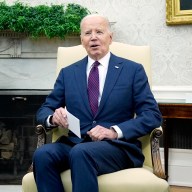 A chimpanzee in the Budongo Trail at Edinburgh Zoo holds a chimp-proof camera.
A chimpanzee in the Budongo Trail at Edinburgh Zoo holds a chimp-proof camera.
Credit: Getty Images
As animal intelligence becomes better understood, treatment has improved in many countries, and you will see fewer monkeys in circuses. But attorney Steven Wise, president of the Nonhuman Rights Project, is going much further, seeking to obtain the first “legal person” status for chimpanzees in a New York court.
Metro: The NRP have wanted such legal rights for animals for many years. Why make this the first court case?
Wise: We have been working on the problem generally and decided New York State was the right location, and these chimpanzees were the right subjects. We found two chimps had died in a few weeks in a roadside zoo, and so we filed on behalf of the four surviving chimps. This would change their legal status from “thing” to being with capacity for rights such as bodily liberty.
Are you going to be laughed out of court?
We believe in our argument but as no one has made it, the first judge won’t have confronted the issue and we won’t win the lower court. We want a good record to then take to the appellate court, and then higher courts. I’ve been working on this case for 28 years, and we have seriously prepared since 2007, so I believe we have a reasonable chance.
Is public opinion on your side?
Yes, we commissioned a recent poll and most Americans across the political spectrum believed chimps should have the rights of a human child. Some believed they already did. Most outside of the exploitation business instinctively agree.
How far do you want chimpanzee rights to go? And for other animals?
Chimps have autonomy – that should be sufficient to have them declared legal persons and have their liberty. Other rights remain to be seen on a case-by-case basis. I’m not saying they should have the vote or education, but they should be left alone and unharmed. That protection requires the status of a person with the capacity for rights, and beyond that we can argue case by case. We just want to open the argument and breach the divide. We are using a 1772 case of a slave using common law to achieve freedom as a blueprint.












